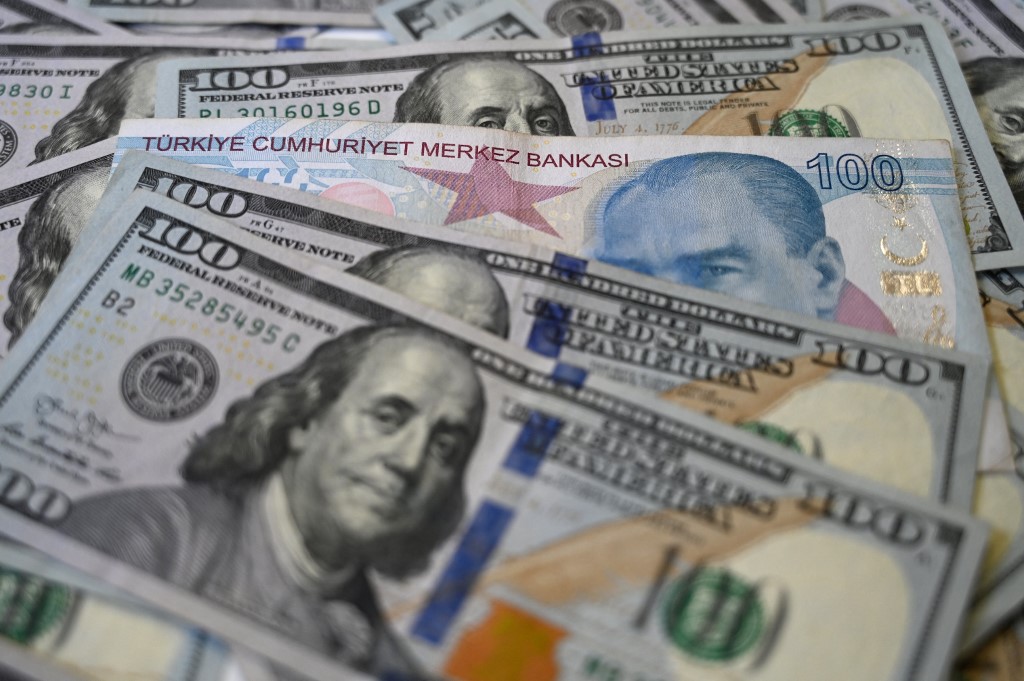Turkey’s troubled lira extended on Tuesday a stirring recovery that erased nearly a month of historic losses after President Recep Tayyip Erdoğan introduced emergency currency support measures, Agence France-Presse reported.
The mercurial Turkish leader stunned markets and his political opponents late Monday by effectively tying the value of some lira bank deposits to the dollar.
Economists and many Turks were still trying to decipher how this new exchange mechanism will work or where the government will get the money to pay for it.
But the impact on the lira — which had lost 45 percent against the greenback from the start of November to late Monday afternoon — was monumental.
It was trading down 10 percent on the day by the time Erdoğan appeared on national television to announce his new economic proposals.
It was trading up 20 percent a few hours after Erdoğan had finished.
“We finally understood that the Erdoğan administration cares about the exchange rate, and has avoided capital controls,” economist Timothy Ash of BlueBay Asset Management said in a note to clients.
“Erdoğan affirmed that he believes in markets, albeit not interest rates.”
‘Indirect rate hike’
Erdoğan has cited Islamic rules against usury to defend his unconventional belief that high interest rates cause inflation.
Economists almost universally agree that high lending costs actually lower prices by encouraging consumers to save and curbing business spending.
Erdoğan has pushed the central bank to slash its policy rate to far below the annual pace of consumer price increases — now at 21 percent and expected climb substantially higher.
This meant that Turks who put liras in their bank accounts were effectively losing money.
Economists feared that Turkey could see a potentially paralyzing run on the banks unless something was done quickly.
Erdoğan’s new policy — dubbed an “indirect interest rate hike” by former treasury adviser Mahfi Eğilmez — is meant to defend the value of lira holdings against fluctuations in the exchange rate.
It guarantees that the government will cover any depreciation of new lira deposits against the dollar when the investments mature.
The finance ministry said individual Turks had to hold their liras in the bank for at least three months for the policy to take effect.
“In case the money is withdrawn from the account before the maturity date … the right of (guaranteed) interest will be eliminated,” the finance ministry said in a statement.
‘No shift to orthodoxy’
The policy is designed to manage inflation expectations and make Turks feel safer about their lira assets.
“If the exchange rate increases by 40 percent, and the interest rate increases by 14 percent, 26 percentage points will be paid in compensation,” Eğilmez explained on Twitter.
The lira shot up by a further 22 percent early Tuesday. It then erased all those gains before climbing back a few percentage points in the evening.
A dollar was worth around 13.0 liras late Tuesday.
It has clawed back nearly 40 percent from its historic low but is still down 40 percent against the dollar since the year started.
Many analysts question whether Erdoğan — struggling to rebuild his sagging approval ratings before an election due by mid-2023 — has settled on a sustainable economic model.
“The treasury will pay for it with taxes,” former Turkish economy minister Ali Babacan told reporters. “This is the dollarization of the country’s economy.”
Economists also expressed doubt about whether the move could truly protect Turks from rapid cost of living increases.
“This scheme likely has bought time and avoided an immediate crash in the banking sector but it has done nothing to fight inflation.”
Analyst Jason Tuvey of Capital Economics interpreted the moves as “a sign that policymakers are trying to find ways to live with a weaker lira and won’t shift back to orthodoxy.”


